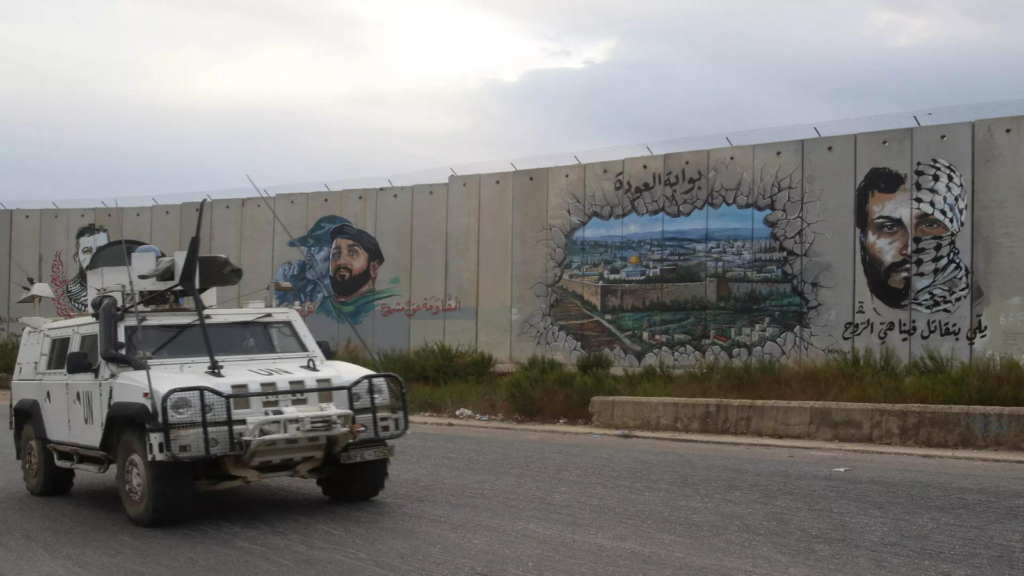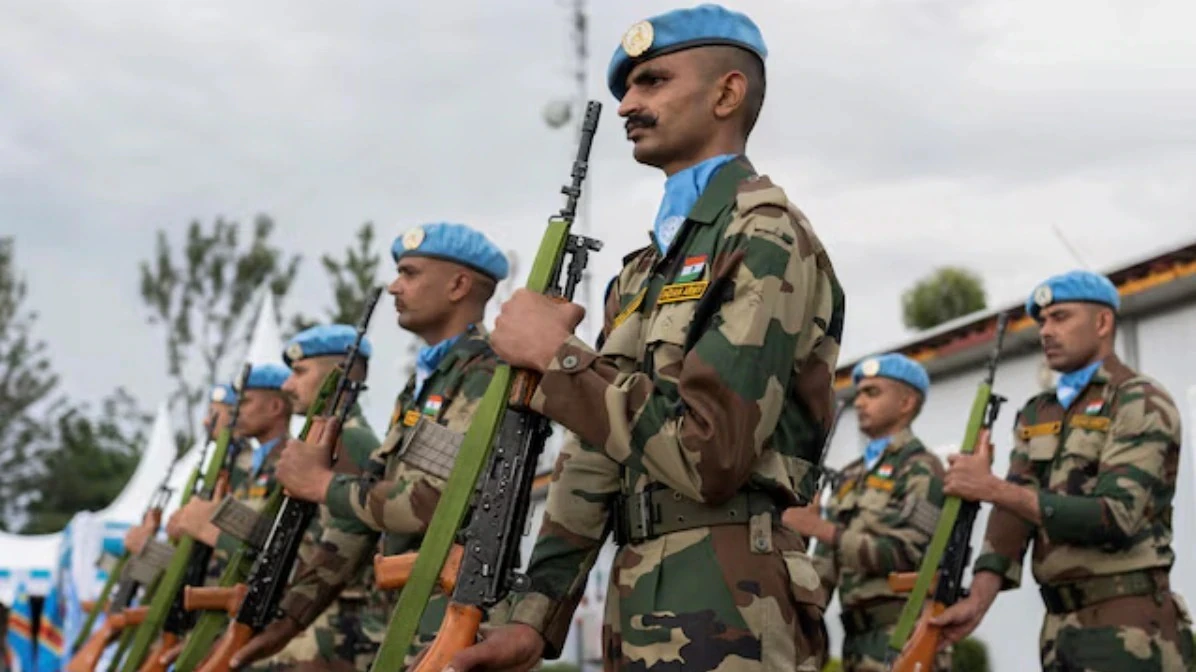India has expressed deep concern over the recent escalation of violence in Lebanon, following an attack by Israeli forces on a United Nations (UN) facility in southern Lebanon.
The Indian Ministry of External Affairs (MEA) has been monitoring the situation closely, particularly because of the involvement of Indian soldiers stationed as part of the United Nations Interim Force in Lebanon (UNIFIL).
While the Indian troops were not at the facility at the time of the attack, the heightened tensions in the region have raised alarms in New Delhi. This incident is part of the broader conflict between Israel and Hezbollah, the Lebanese militant group, which has intensified since the start of hostilities in October 2023.
India Concerned as Israel Hits UN Facility in Lebanon Where 900 Indian Soldiers Are Stationed. Israel has defended its actions, claiming that Hezbollah has been launching attacks from positions near UN facilities, which has resulted in a complex and dangerous situation along the Blue Line, the UN-recognized demarcation line between Israel and Lebanon.
As tensions escalate, the safety of UN peacekeepers, including approximately 900 Indian soldiers, remains a primary concern for the Indian government. The violation of UN premises, including the targeting of its facilities, has sparked international outcry, especially given the grave risks posed to peacekeeping personnel in the region.
India’s Response to the Israeli Attack
India has been one of the key contributors to UN peacekeeping missions worldwide, and its commitment to maintaining international peace and security is well known. The attack on the UN facility in southern Lebanon, where Indian peacekeepers are stationed, has led to a firm response from New Delhi.
Read : IDF Destroys Hezbollah Tunnel, Shares Video Showing Arms Inside It: Watch
In its official statement, the Indian Ministry of External Affairs emphasized its concerns about the deteriorating security situation along the Blue Line. The MEA stressed the importance of safeguarding the sanctity of UN premises and ensuring the safety of peacekeepers operating under the UN mandate.
Read : Israel Has Lost Sovereignty in Its Northern Quadrant Because of Hezbollah Attack: Blinken
The Indian contingent in Lebanon consists of approximately 900 soldiers, in addition to 25 staff officers, including medical personnel. While these soldiers were not at the UNIFIL headquarters during the attack, the incident has underscored the risks faced by peacekeepers in conflict zones.

India reiterated that the inviolability of UN premises must be respected by all parties involved in the conflict, and appropriate measures should be taken to protect the safety of UN personnel.
This is not the first time Indian peacekeepers have been placed in harm’s way while serving in volatile regions. India’s involvement in Lebanon dates back several years, and its soldiers have played a crucial role in maintaining peace along the contentious Blue Line.
The MEA’s statement further reiterated India’s commitment to supporting the UN’s efforts to restore stability in the region. However, the situation remains precarious as Israel continues to defend its actions by pointing to Hezbollah’s activities near UN installations.
Israel’s Justification for Its Actions
The Israeli Defense Forces (IDF) have defended their actions, stating that Hezbollah, the Iranian-backed militant group, has been using positions near UN facilities to launch attacks on Israel.
Since the start of the conflict in October 2023, Hezbollah has fired over 130 rockets, many of which have been launched from areas within 300 meters of UN installations. The IDF claims that these rockets, as well as other attacks, have targeted Israeli civilian areas, forcing the Israeli military to respond.
Israel has argued that its military operations in southern Lebanon are aimed at dismantling Hezbollah’s infrastructure and neutralizing the threat posed by the group’s missile and rocket attacks.
The IDF released maps showing that Hezbollah’s military assets are situated dangerously close to UN facilities, making it difficult for Israeli forces to avoid hitting these sites during their raids. The IDF’s actions have been framed as a defensive response to Hezbollah’s “unprovoked” aggression, which began in October 2023.

According to Israel, Hezbollah’s attacks have already led to significant casualties and damage in northern Israel. The ongoing conflict has forced tens of thousands of Israeli civilians to evacuate their homes, while the IDF has been conducting targeted operations to protect its population from further harm.
While Israel acknowledges the importance of UN peacekeeping efforts, it maintains that Hezbollah’s proximity to these UN positions has created a dangerous situation, complicating its military operations.
However, the UN and other international bodies have expressed concerns over the deliberate targeting of UN facilities. The UN has reminded Israel of its obligations under international humanitarian law and the need to respect the sanctity of UN premises.
Despite Israel’s justifications, the international community remains alarmed at the potential for further escalation in the conflict and the increasing risks to UN peacekeepers stationed in Lebanon.
The Role of UNIFIL and the Blue Line Conflict
The United Nations Interim Force in Lebanon (UNIFIL) has been operating in southern Lebanon since 1978. Its primary mandate is to ensure peace and security along the Blue Line, a demarcation line established by the UN to confirm Israel’s withdrawal from Lebanon in 2000.
UNIFIL’s role includes monitoring ceasefires, assisting the Lebanese government in securing its borders, and facilitating humanitarian assistance in the region.
The Blue Line, which stretches for 120 kilometers, is not an official international border but rather a temporary line of withdrawal. It remains a sensitive and highly contested area, particularly given the presence of Hezbollah fighters and Israeli forces on either side.
Since the 2006 Lebanon War, UNIFIL has worked to maintain a fragile peace in the region, but the recent escalation of hostilities has threatened to undo years of peacekeeping efforts.
UNIFIL’s headquarters in Naqoura, located along the southern border of Lebanon, has been hit multiple times since the conflict between Israel and Hezbollah reignited. In one incident, an Israeli Merkava tank fired on an observation tower at UNIFIL’s headquarters, injuring two peacekeepers.
The UN has condemned these attacks and urged all parties to respect the safety and security of its personnel. UNIFIL peacekeepers, including the Indian contingent, play a vital role in supporting a return to stability in the region.
The UN has expressed alarm at the deliberate targeting of its facilities, highlighting that such actions violate international law and Security Council Resolution 1701. This resolution, adopted in 2006, was intended to bring an end to the hostilities between Hezbollah and Israel.

It calls for a permanent ceasefire, the disarmament of armed groups in Lebanon, and the establishment of a buffer zone free of any military presence. UNIFIL’s mission is to oversee the implementation of this resolution, but the recent violence has complicated its efforts.
India, as a key contributor to UN peacekeeping missions, has underscored the importance of maintaining the inviolability of UN premises. The attack on UNIFIL’s headquarters in Naqoura has put the safety of peacekeepers at risk, and India has urged all parties to respect the UN’s mandate and ensure the safety of its personnel.
The situation along the Blue Line remains tense, with ongoing clashes between Israeli forces and Hezbollah fighters raising concerns about further escalation. The recent attack by Israeli forces on a UN facility in southern Lebanon has drawn international attention, particularly due to the involvement of Indian peacekeepers stationed in the region.
While none of the Indian soldiers were harmed in the attack, the incident has highlighted the dangers faced by UN personnel operating in conflict zones. India has expressed deep concern over the situation and called for the inviolability of UN premises to be respected.
The broader conflict between Israel and Hezbollah continues to escalate, with both sides accusing the other of violating international norms. Israel maintains that its actions are necessary to neutralize the threat posed by Hezbollah, while the UN and other international actors have condemned the targeting of UN facilities.
As the conflict drags on, the safety of peacekeepers, including the Indian contingent, remains a critical concern for New Delhi. India’s commitment to UN peacekeeping remains unwavering, and the Indian government is likely to continue advocating for the protection of UN personnel and the peaceful resolution of conflicts.
However, the situation in southern Lebanon is far from stable, and the risks to peacekeepers and civilians alike are growing as the violence continues.

